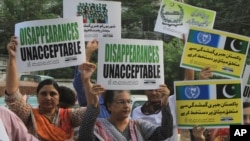Rights defenders are demanding Pakistan immediately criminalize the practice of enforced disappearances they say has caused years of agony to thousands of families across the country.
Pakistani security forces have been battling extremist and militant groups since the country joined the U.S.-led war on terror in 2001. Critics allege the anti-terrorism operations have resulted in thousands of Pakistanis being detained by state security institutions, without their whereabouts and health conditions being made available to family members or attorneys.
“In Pakistan, the practice of enforced disappearance has in recent years become a nationwide problem. ... To date, not a single perpetrator has been held to account,” said the independent Human Rights Commission of Pakistan to mark the International Day of the Disappeared.
Rights activists and families of the so-called “missing persons” rallied Tuesday in Islamabad to condemn the detentions as serious human rights violations.
Protesters demanded the Pakistan government immediately ratify the International Convention for the Protection of All Persons from Enforced Disappearance. Without signing the document, they say, the country would not feel the pressure to criminalize the practice of illegal detentions by making laws to protect constitutional rights of Pakistani citizens.
A rally organizer, Tahira Abdullah, said human rights defenders in Pakistan recognize the threat of terrorism and extremism facing the country.
Call for openness
“If you want to arrest someone whom you suspect of being a terrorist, an extremist, a militant, a jihadi, anything, arrest them," Abdullah said. "But the laws of Pakistan, the constitution of Pakistan must be upheld and the case must be produced in an open court so that we know what the charges against them are.
“You can’t keep people disappeared and in internment camps like Guantanamo Bay. We have Pakistani Guantanamo Bays. This is unconstitutional, it is illegal and it must not be allowed to continue,” she said.
Pakistani security agencies have repeatedly denied they have forcibly sequestered, tortured and killed people in the name of counterterrorism.
Despite the official denials, Pakistan’s Supreme Court has acknowledged, and human rights groups have documented, evidence of the involvement of state institutions in the abuses in the name of counterterrorism.
A government-appointed inquiry commission has been investigating the complaints since March 2011.
Of the more than 3,500 cases it had received as of July this year, around 2,100 have been disposed of. The remaining nearly 1,400 include 500 cases the commission has received in the past seven months, according to officials.
But critics question the independence and autonomy of the state panel, saying it does not disclose details about where those people were during the period they could not be traced by their families.
Rights activists also allege those who have returned to their families remain under pressure from security agencies not to discuss what happened to them.




